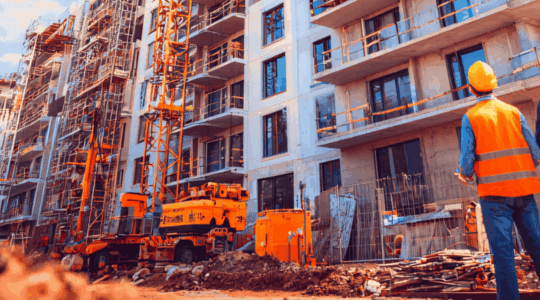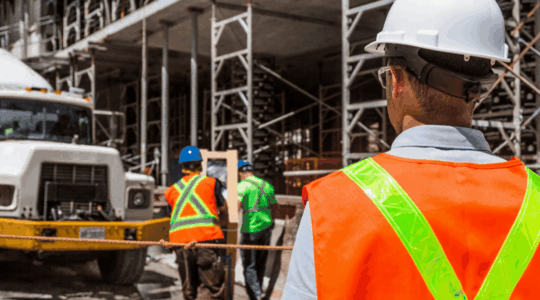Construction
10 Types of Construction Insurance Builders Should Know
August 30, 2023
When Chuck Cisneros decided it was time to start his own construction company, he knew he’d need liability and workers’ compensation insurance for builders. But when he sat down across from his insurance agent, he discovered those were many other construction insurance types he’d never heard about — or imagined he might need.
What Is Construction Insurance?
The many types of insurance in construction vary widely, but all have a common goal of protecting contractors and owners from problems that crop up during or as a result of construction activities.
Types Construction Insurance
Construction insurance requirements will differ based on the nature of the project, the expectations of owners and the contractor’s own tolerance for business risks. However, most projects will involve some combination of the following construction insurance policies.
1. Builders Risk Insurance
As the name implies, builders risk insurance provides coverage for damage that occurs during a construction project. It’s needed because most other types of insurance for contractors and owners do not apply to damage to structures that aren’t finished and ready for occupancy. Other types of insurance for construction are designed to protect people, equipment and property. The builders risk policy steps in when, for example, a severe storm causes damage to unfinished parts of the building, such as the framing. This insurance during construction also applies if the structure is damaged by a fire or vandals while it’s being built.
2. Wrap Insurance (OCIP/CCIP)
Wrap policies are a special type of construction management insurance that packages several different types of construction insurance coverage into a single policy. This type of construction coverage makes it easier for contractors or owners to budget for and manage insurance on their projects. While each of these commercial construction insurance policies is as unique as the project and site, most fall into one of two broad categories:
Owner Controlled Insurance Programs
Generally referred to as OCIPs, this type of insurance in construction contracts allows owners to take control of construction insurance by managing the coverage for the product. Unlike the traditional approach, in which every vendor is responsible for their own building contractor insurance, the owner holds every construction policy for everyone involved. In addition to reducing the total cost of construction insurance, obtaining higher liability limits and heading off disputes between insurance carriers when there’s a claim, OCIPs generally include comprehensive programs for worker and site safety.
Contractor Controlled Insurance Programs
The wrap approach that’s known as a CCIP is similar to an OCIP, but instead of the owner taking responsibility for the construction policies, the general contractor holds every construction insurance policy associated with the project.
3. Workers' Compensation Insurance
Construction is an inherently dangerous activity that requires significant physical demands on workers. Fortunately, most contractors have embraced workplace safety standards in an effort to ensure workers return home safely after a long day’s work. Still, accidents and injuries can happen, and most states expect construction companies to maintain workers’ compensation coverage to protect workers from the financial consequences of treatment and lost work time. The rate a contractor pays for workers’ comp coverage depends primarily on the nature of the work and the company’s record of recordable injuries and claims.
4. Subcontractor Default Insurance
Sometimes, a subcontractor on a project may fail to perform the work they agreed to, or their finished work fails to meet the project’s standards, leading to corrective actions and delays. That’s where subcontractor default insurance can protect a construction manager or general contractor by reimbursing them for costs related to the subcontractor’s performance.
5. Inland Marine Insurance
This type of commercial builders insurance has a misleading name. Normally, marine insurance refers to protection for items being transported by water. Inland marine insurance actually refers to other transportation modes such as trucks and trains, along with components and materials that are temporarily being stored by another company. Suppose your project involves custom fabricated structural equipment or doors, and a truck delivering them to your site becomes involved in a serious accident that renders them unusable. Inland marine insurance would cover your loss.
6. Pollution Liability Insurance
Construction incidents that lead to pollution are more than embarrassing. They can be highly dangerous and unthinkably expensive to remediate. That’s why savvy construction managers buy pollution liability insurance coverage.
If a contractor does or neglects something on a job site that contributes to a pollution event, the policy covers the costs for property damage, injuries and any associated legal defense costs. Most policies also cover events caused by a contractor’s subcontractor or others doing work for the contractor.
7. General Liability Insurance for Construction
General construction liability insurance is a construction all-risk insurance coverage that addresses common risks such as a non-worker being injured on your site, damage to a third party’s vehicle or other property, something that happened during construction that later caused damages or other business-related issues such as copyright violations. If any of the covered events occur on your site, this insurance for a construction company would pay for repairs, replacements or medical bills.
8. Professional Liability Insurance
Getting sued over the quality of your work or for something one of your subs did on your site can be a legal nightmare. Often referred to as E&O (errors and omissions) coverage, professional liability insurance protects you in situations like those and many others.
In construction, delays can lead to lawsuits. Your delay may have been caused by a supply-chain problem, but you missed the contractual deadline, which caused the owner to come after you for business losses. Whether you’re ultimately found to be in the wrong or not, your legal fees and any settlements will be covered by typical policies.
9. Commercial Auto Insurance
Today, even a small auto accident can be costly. In our litigious society, there are those who view accidents with trucks and equipment operated by construction companies as an opportunity to pursue a big-dollar lawsuit. So while you want to make sure your vehicles (and those being used by contractors on your project) carry all state-required insurance coverage, it’s good business sense to carry additional liability coverage.
10. Construction Bonds
A construction bond is essentially a legal promise that you’ll accomplish what you say you’re going to in a way that meets the other party’s expectations. It assures the project owner that if the contractor fails to live up to the terms of the contract in any way, and that failure leads to added costs, all of the project’s bills will be paid.
Construction bonds are often part of public works and other government projects. In most states, such projects are awarded through a bidding process, and one of the requirements of the typical bidding process is for the contractor to obtain a construction bond.
Construction Insurance Considerations
What insurance does a construction company need? Construction insurance coverage isn’t a one-policy-fits-all product. Every company’s situation and needs differ greatly.
Construction Insurance Requirements
Generally, contracts with construction managers and owners spell out the types and levels of commercial construction insurance requirements for the insurance of building projects. In most states, there are minimum requirements for workers’ compensation and commercial vehicle coverage. And of course, with an OCIP or CCIP, the owner or construction manager generally assumes all the insurances in construction. This type of insurance for building projects and specific items that are covered varies widely
How Much Does Construction Insurance Cost?
For most, construction insurance types is a competitive market, but U.S. construction insurance costs have risen in recent years due largely to damages awarded in court cases. Today, construction professionals can expect to pay around $1,000 to $1,200 annually for general construction liability insurance. Monthly workers’ compensation premiums are often in the $250 to $300 range. Commercial auto insurance is generally about $150 to $200 per month, and professional liability coverage typically runs $40 to $80 per month for a $300,000 policy.
Understanding construction insurance is important for contractors, construction managers and whoever will own the finished project. While developing a working knowledge of coverages and how they work is good, an even better approach is choosing an insurance partner that understands your industry and can determine what you need for your specific business risks.
Learn More
Hylant’s dedicated construction industry insurance team works with contractors, construction companies, and building owners to understand and address their risks from an insurance perspective. Working with our clients, we minimize the potential financial and reputational impacts of issues on construction sites, creating peace of mind while meeting legal requirements.
Contact Hylant today to discuss your construction business insurance needs.
The above information does not constitute advice. Always contact your insurance broker or trusted advisor for insurance-related questions.


